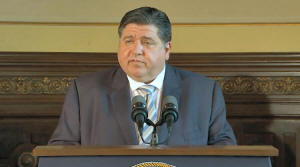Pritzker signs 4 laws to help the LGBTQ+ community
 Send a link to a friend
Send a link to a friend
 [July 28, 2021]
By Andrew Hensel [July 28, 2021]
By Andrew Hensel
(The Center Square) – Gov. J.B. Pritzker
held a news conference at The Center on Halstead to sign four bills into
law to help LGBTQ+ communities.
The Governor sat in a packed conference room in Chicago filled with
lawmakers and members of the LGBTQ+ community. Pritzker discussed the
new laws he was there to sign.
The new bills include changes in marriage licenses and decriminalizing
HIV transmission as well as insurance policy changes.
-
HB 3709, updates the state’s existing infertility
insurance law to include LGBTQ+ families and single parents while
reducing the wait time for women over 35
-
SB 139, establishes a process for individuals to
correct the gendered language on their marriage certificates
-
HB 2590, creates a uniform standard that county
clerks must adhere to for name changes on marriage certificates
-
HB 1063, repeals a 1986 HIV law
One of the laws, HB 1063, repeals the statute creating the offense
of criminal transmission of HIV, according to a summary.

[to top of second column]
|

Gov. J.B. Pritzker speaks in Springfield on
Tuesday, June 29, 2021.
Courtesy of
social media

State Rep. Carol Ammons said the old was not
effective. She that since 1986, 80 people across the country the
have been charged with criminal transmission of HIV.
Pritzker said his administration's mission is to help lift up those
that need it most.
“Today, I’ll sign four new bills into law that advance Illinoisans’
ability to live their fullest lives as their truest selves,” he
said. "My administration is on a mission to lift up and empower
those who too often have been overlooked or forgotten. Today, the
State of Illinois is taking another step to advance that mission.”
Lt. Gov. Juliana Stratton spoke about what these laws mean for the
state of Illinois.
"These pieces of critical legislation are a commitment to justice,”
she said. “We will continue this important work of ensuring Illinois
is an inclusive state that is safe for members of our LGBTQ
community to be their authentic selves and live free from
discrimination.” |